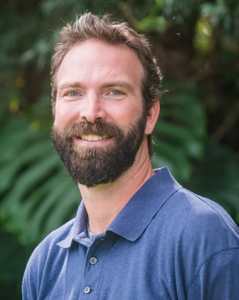By: Brian Konik, Ph.D.
Primary Therapist
As I look forward to working with a new group of students this summer at Pacific Quest, I am reminded of what a unique opportunity the gardens provide when designing individualized interventions. I feel very fortunate that, after spending over 20 or so years researching and designing interventions for individuals struggling with anxiety disorders, I have found an environment that facilitates a comprehensive interdisciplinary approach. I rely heavily on the principles of Cognitive Behavior Therapy (CBT) and Applied Behavior Analysis (ABA) when designing exposure-based intervention. The students at Pacific Quest are immersed in an environment that integrates daily access to meditation, yoga, horticultural therapy, and mindfulness exercises to provide a perfect complement to a CBT and ABA approach.

Dr. Brian Konik
I often say to parents and students that although problematic anxiety is one of the most prevalent, researched, and reliably treated psychological phenomena, it is also alarmingly underreported and treatment is not regularly pursued. Why is that? We find that those dealing with significant anxiety often avoid the experiences and/or settings that cause the anxiety and they ultimately fall into a pattern of avoidance behavior that stifles their development. Eventually parents and loved ones find themselves in a position where they have to insist on treatment. The PQ setting is unique because we are able to manipulate environmental variables to engage in exposure-based interventions with our students and to subsequently reinforce an evidence-based approach to therapy.
Our ability to individualize the student experience provides me the opportunity to weave evidence-based practices for anxiety into the overall program. Students who struggle to thrive at home or at school are being challenged in the Pacific Quest gardens to face their fears head-on and to break the cycle of being anxious about being anxious — worrying about worrying — panicking that they may panic. Watching students who experience generalized anxiety, obsessive-compulsive behaviors, panic attacks, social anxiety, Tourette Syndrome, selective mutism, body dysmorphic disorder, and specific phobias overcome their challenges and begin to thrive in the PQ model is an incredibly rewarding experience for me as a Clinical Psychologist. I can’t wait to join another group of students on their journeys to overcome anxiety in whatever form it appears to them!
Treating Anxiety: Overcoming the Fear of Fear Itself
By: Brian Konik, Ph.D. Primary Therapist As I look forward to working with a new group of students this summer at Pacific Quest, I am reminded of what a unique opportunity the gardens provide when designing individualized interventions. I feel very fortunate that, after spending over 20 or so years researching and designing interventions for individuals …
By: Brian Konik, Ph.D.
Primary Therapist
As I look forward to working with a new group of students this summer at Pacific Quest, I am reminded of what a unique opportunity the gardens provide when designing individualized interventions. I feel very fortunate that, after spending over 20 or so years researching and designing interventions for individuals struggling with anxiety disorders, I have found an environment that facilitates a comprehensive interdisciplinary approach. I rely heavily on the principles of Cognitive Behavior Therapy (CBT) and Applied Behavior Analysis (ABA) when designing exposure-based intervention. The students at Pacific Quest are immersed in an environment that integrates daily access to meditation, yoga, horticultural therapy, and mindfulness exercises to provide a perfect complement to a CBT and ABA approach.
Dr. Brian Konik
I often say to parents and students that although problematic anxiety is one of the most prevalent, researched, and reliably treated psychological phenomena, it is also alarmingly underreported and treatment is not regularly pursued. Why is that? We find that those dealing with significant anxiety often avoid the experiences and/or settings that cause the anxiety and they ultimately fall into a pattern of avoidance behavior that stifles their development. Eventually parents and loved ones find themselves in a position where they have to insist on treatment. The PQ setting is unique because we are able to manipulate environmental variables to engage in exposure-based interventions with our students and to subsequently reinforce an evidence-based approach to therapy.
Our ability to individualize the student experience provides me the opportunity to weave evidence-based practices for anxiety into the overall program. Students who struggle to thrive at home or at school are being challenged in the Pacific Quest gardens to face their fears head-on and to break the cycle of being anxious about being anxious — worrying about worrying — panicking that they may panic. Watching students who experience generalized anxiety, obsessive-compulsive behaviors, panic attacks, social anxiety, Tourette Syndrome, selective mutism, body dysmorphic disorder, and specific phobias overcome their challenges and begin to thrive in the PQ model is an incredibly rewarding experience for me as a Clinical Psychologist. I can’t wait to join another group of students on their journeys to overcome anxiety in whatever form it appears to them!
Questions? Call or Text our Admissions Team: 808-937-5806